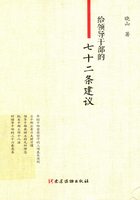Both these qualities--his disposition to revise his opinions in the light of new arguments and changing conditions, and the reticence he maintained till the process of revision had been completed--exposed him to misconstruction.Commonplace men, unwont to give serious scrutiny to their opinions, ascribed his changes to self-interest, or at best regarded them as the index of an unstable mind.Dull men could not understand why he should have forborne to set forth all that was passing in his mind, and saw little difference between reticence and dishonesty.Much of the suspicion and even fear with which he was regarded, especially after 1885, arose from the idea that it was impossible to predict what he would do next, and how far his openness of mind would carry him.In so far as they tended to shake public confidence, these characteristics injured him in his statesman's work, but the loss was far outweighed by the gain.In a country where opinion is active and changeful, where the economic conditions that legislation has to deal with are in a state of perpetual flux, where the balance of power between the upper and middle and poorer classes has been swiftly altering during the last sixty years, no statesman can continue to serve the public if he adheres obstinately to the views with which he started in life.He must--unless, of course, he stands aloof in permanent opposition--either submit to advocate measures he secretly mislikes, or else must keep himself always ready to learn from events, and to reconsider his opinions in the light of emergent tendencies and insistent facts.Mr.Gladstone's pride as well as his conscience forbade the former alternative; it was fortunate that the inexhaustible activity of his intellect made the latter natural to him.He was accustomed to say that the great mistake of his earlier views had been in not sufficiently recognizing the worth and power of liberty, and the tendency which things have to work out for good when left to themselves.The application of this principle gave room for many developments, and many developments there were.He may have wanted that prescience which is, after integrity, the highest gift of a statesman, but which is almost impossible to a man so pressed by the constant and engrossing occupations of an English minister that he cannot find time for the patient study and thought from which alone sound forecasts can issue.But he had the next best quality, that of always learning from the events which passed under his eyes.
With this singular openness and flexibility of mind, there went a not less remarkable ingenuity and resourcefulness.His mind was fertile in expedients, and still more fertile in reasonings by which to recommend the expedients.This gift was often dangerous, for he was apt to be carried away by the dexterity of his own dialectic, and to think schemes substantially good in whose support he could muster so formidable an array of arguments.He never seemed to be at a loss, in public or private, for a criticism, or for an answer to the criticisms of others.If his power of adapting his own mind to the minds of those whom he had to convince had been equal to the skill and swiftness with which he accumulated a mass of matter persuasive to those who looked at things in his own way, no one would have exercised so complete a control over the political opinion of his time.But his mind had not this power of adaptation.
It moved on its own lines--peculiar lines, which were often misconceived, even by those who sought to follow him most loyally.
Thus it happened that he was blamed for two opposite faults.Some, pointing to the fact that he had frequently altered his views, denounced him as a demagogue profuse of promises, ready to propose whatever he thought likely to catch the people's ear.Others complained that there was no knowing where to have him; that he had an erratic mind, whose currents ran underground and came to the surface in unexpected places; that he did not consult his party, but followed his own predilections; that his guidance was unsafe because his decisions were unpredictable.Both these views were unfair, yet the latter came nearer to the truth than the former.No great popular leader had in him less of the true ring of the demagogue.
He saw, of course, that a statesman cannot oppose the popular will beyond a certain point, and may have to humor it in order that he may direct it.Now and then, in his later days, he so far yielded to his party advisers as to express his approval of proposals for which he cared little personally.But he was too self-absorbed, too eagerly interested in the ideas that suited his own cast of thought, to be able to watch and gage the tendencies of the multitude.On several occasions he announced a policy which startled people and gave a new turn to the course of events.But in none of these instances, and certainly not in the three most remarkable,--his declarations against the Irish church establishment in 1868, against the Turks and the traditional English policy of supporting them in 1876, and in favor of Irish home rule in 1886,--did any popular demand suggest his pronouncement.It was the masses who took their view from him, not he who took his mandate from the masses.In all of these instances he was at the time in opposition, and was accused of having made this new departure for the sake of recovering power.
In the two former he prevailed, and was ultimately admitted, by his more candid adversaries, to have counseled wisely.In all of them he may, perhaps, be censured for not having sooner perceived, or at any rate for not having sooner announced, the need for reform.But it was very characteristic of him not to give the full strength of his mind to a question till he felt that it pressed for a solution.















